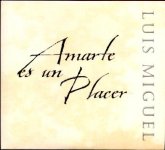
"Amarte Es un Placer" is a song recorded by Mexican singer Luis Miguel and the fourth and final single from his album of the same name (1999). Released in 2000, it was written by Juan Carlos Calderón, while production was handled by Miguel. Lyrically, "Amarte Es un Placer" deals with a narrator describing the pleasures of being enamored with his lover.

"No Me Dejes de Querer" is a song by Cuban American singer Gloria Estefan from her ninth studio, Alma Caribeña (2000). The song was written by the artist along with her husband Emilio Estefan and Roberto Blades. The latter two also handled the song's production. It was released as the album's lead single on March 27, 2000 by Epic Records. "No Me Dejes de Querer" is a son cubano and murga song in which the narrator pleads her lover to never stop loving her. The song was met with mostly positive reactions who found it to be an upbeat number.

"Cómo Me Duele Perderte" is a song by Cuban American singer Gloria Estefan from her ninth studio, Alma Caribeña (2000). The song was written by Marco Flores with her husband Emilio Estefan and Roberto Blades handling its production. It was released as the album's second single on July 10, 2000, by Epic Records. "Cómo Me Duele Perderte" is a salsa and bachata track that narrates the singer in pain of losing someone. The song was met with unfavorable reactions from two music critics although one reviewer enjoyed the remixes. Commercially, the song topped the Billboard Hot Latin Songs and Tropical Airplay charts in the United States, while also peaking at number 12 on the Dance Club Songs chart in the same country and number eight in Spain. The accompanying music video was directed by Emilio, filmed in Miami, Florida, and features dramatic scenes.
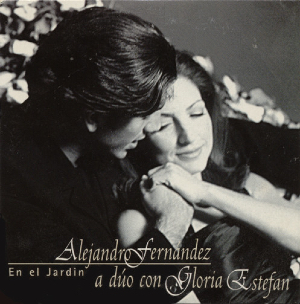
"En El Jardín" is a song written by Kike Santander and performed by Mexican recording artist Alejandro Fernández. It was co-produced by Santander and Emilio Estefan and features Cuban-American singer Gloria Estefan. It was released as the second single from Me Estoy Enamorando by Sony Music Mexico in 1997. The song is a pop ballad and portrays both singers falling in love, as if the love blossomed from a garden. A music video featuring both artists was made for the track.

"Miente" is a song by Spanish singer Enrique Iglesias from his second studio album, Vivir (1997). The song was written and produced by Rafael Pérez-Botija. It was released as the third single from the album in 1997. An uptempo pop power ballad backed by a piano and percussion, the song deals with the singer being in denial about a relationship ending.

"Esperanza" is a song by Spanish singer Enrique Iglesias for his third studio album Cosas del Amor (1998). It was co-written by Igleias and Chein García-Alonso with Rafael Pérez-Botija handling its production. A power ballad, it is a confessional song of love and forgiveness. Upon "Esperanza"'s release, one reviewer lauded Iglesias's vocals and the song's arrangements while another found it too similar to his debut single "Si Tú Te Vas". Filmed in Malibu, California, the accompanying music video for "Esperanza" was directed by Emmanuel Lubezki, which won Video of the Year at the 11th Annual Lo Nuestro Awards in 1999. "Esperanza" also won "Song of the Year" and an American Society of Composers, Authors and Publishers (ASCAP) Latin Award in the same year. Commercially, it reached number one in Guatemala, Nicaragua, and Panama as well as the Billboard Hot Latin Songs and Latin Pop Airplay charts in the United States, while becoming top-five hit in Colombia, Costa Rica, Honduras and El Salvador.

"Nunca Te Olvidaré" is a song by Spanish singer Enrique Iglesias for his third studio album Cosas del Amor (1998). It was written by Iglesias with Rafael Pérez-Botija handling its production. A power ballad, it is a confessional song of staying in love through time and other lovers. Upon its release, it was met with generally positive reactions from music critics, although one reviewer was less impressed with it along with the other ballads from the album. The song was featured as the main theme for the 1999 Mexican telenovela of the same name.

"Entre el Mar y una Estrella" is a song by Mexican singer Thalía from her sixth studio album, Arrasando (2000). It was released as the album's lead single on 27 March 2000 by EMI Latin. The song was written and co-produced by Emilio Estefan and Marco Flores. The track is a pop ballad that deals with lost love and the song was dedicated to her former lover Alfredo Díaz Ordaz who died in 1993.

"¡Basta Ya!" is a song by Puerto Rican singer Olga Tañón from her fourth studio album, Nuevos Senderos (1996). The song was written and produced by Marco Antonio Solís. It was released as the lead single from the album in 1996. "A ballad, the song is about unrequited love and marked a musical departure from Tañón's merengue recordings. The song was nominated for Pop Song of the Year at the 1997 Lo Nuestro Awards. Commercially, it topped both the Billboard Hot Latin Songs and Latin Pop Airplay charts in the United States. A music video for the song was filmed and features a couple's failing relationship.
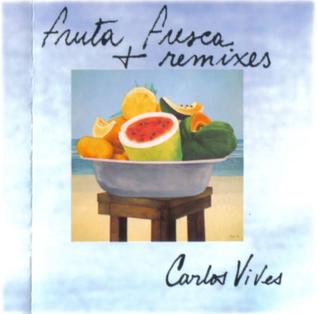
"Fruta Fresca" is a vallenato song written and performed by Colombian recording artist Carlos Vives and produced by Emilio Estefan and Juan Vicente Zambrano as the lead single from his studio album El Amor de Mi Tierra (1999). The song incorporates the sound of Latin pop and Colombian vallenato music. In the song, he compares his lover's kisses to fresh fruit. The track was well received by critics who praised the production of the record. "Fruta Fresca" became Vives' first number-one hit on the Billboard Hot Latin Songs chart.

"Si Tú Supieras" is a song written by Kike Santander and performed by Mexican recording artist Alejandro Fernández. It was co-produced by Santander and Emilio Estefan and was released as the first single from Me Estoy Enamorando by Sony Music Mexico on 18 August 1997. The song is a bolero-pop ballad with ranchera influences and portrays the singer yearning for his lover to know how much she means to him. A music video was made for the track and was used as the main theme for the Mexican telenovela María Isabel.

"No Sé Olvidar" is a song written by Kike Santander and performed by Mexican recording artist Alejandro Fernández. It was co-produced by Santander and Emilio Estefan and was released as the third single from Me Estoy Enamorando by Sony Music Mexico in 1997. The song is a bolero-pop ballad with ranchera influences and portrays the singer desperately trying to forget his lover. A music video was made for the track which features Fernández hopelessly attempting to not remember his lover only to slowly delve into insanity. It received a nomination for Video of the Year at the 1998 Lo Nuestro Awards.

"Yo Nací Para Amarte" is a song written by Kike Santander and performed by Mexican recording artist Alejandro Fernández. It was co-produced by Santander and Emilio Estefan and was released as the fourth and final single by Sony Music Mexico from Me Estoy Enamorando in 1998. The song is a bolero-pop ballad with ranchera influences and portrays the singer confessing his love which he admits "goes beyond reason".

"No Quiero Na' Regala'o" is a song by Puerto Rican salsa band El Gran Combo de Puerto Rico from their studio album De Punta a Punta (1971). Written by Perín Vasquez, it deals with the singer not wanting love merely out of pity.
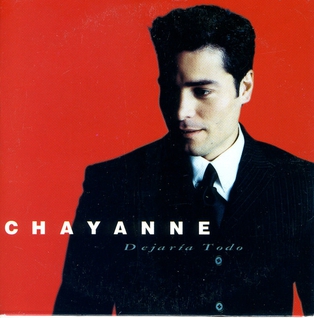
"Dejaría Todo" is a song by Puerto Rican singer Chayanne from his ninth studio album, Atado a Tu Amor (1998). The song was written and produced by Estéfano and released as the lead single from the album in September 1998 by Sony Discos.The rock ballad details everything the singer is capable of doing for his lover. The song received generally positive reactions from music critics and is listed among Chayanne's best songs. A music video for the song was filmed and features a dark scenery. Commercially, it topped the Billboard Hot Latin Songs and Latin Pop Airplay charts in the United States. The track was nominated for Pop Song of the Year at the 11th Lo Nuestro Awards and Song of the Year at the inaugural Ritmo Latino Music Awards in 1999 and was acknowledged as an award-winning song at the 2000 Broadcast Music, Inc. (BMI) Latin Awards.

"Una Voz en el Alma" is a song performed by Puerto Rican-American singer Millie Corretjer from his third studio album Amar Es un Juego (1999). It was released as the lead single by EMI Latin on December 14, 1998 and became her first #1 on the Billboard Latin Pop Airplay chart in the US. El Norte Deborah Davis gave the song a positive review, citing it along with "Llora Por Él" where the singer "uses all her interpretive resources to shine brightly." It was recognized as one of the best-performing songs of the year at the ASCAP Latin Awards under the pop/ballad category in 2000.
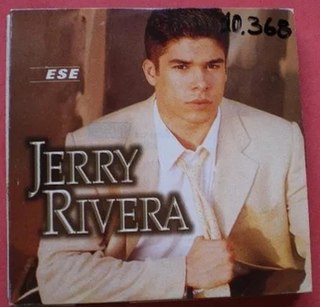
"Ese" is a song performed by Puerto Rican-American singer Jerry Rivera from his ninth studio album De Otra Manera (1998). The song became his first #1 on the Hot Latin Tracks chart and fifth overall on the Tropical Airplay chart. It was acknowledged as an award-winning song at the 2000 BMI Latin Awards. Two versions of the song were recorded, one in salsa and the other a bolero. The success of releasing two versions of the song to Latin radio stations led to Sony Discos having their artists record multiple versions of the same song. José A. Estévez, Jr. of AllMusic felt that Rivera "demonstrates with conviction" in the song. Eliseo Cardona of El Nuevo Heradl stated that the song "can be taken as a signal of alert It shows in any case that it was already time to get out of the monotony accumulated by his discography After listening to the song it is force majeure to recognize that the latter was fulfilled." The song was later featured as the main theme for the Mexican telenovela Mirada de mujer (1998). The music video for the song featured the ballad version and was directed by Steve Bielo.

"Por Mujeres Como Tú" is a song by Mexican singer Pepe Aguilar from his 1998 studio album of the same name. The song won Billboard Latin Music Award for Hot Latin Song of the Year and was nominated in the category of Regional Mexican Hot Latin Track of the Year. It also won the Lo Nuestro Award for Regional Mexican Song of the Year in 1999. In addition, the track was recognized as song of the year on the Regional Mexican field at the ASCAP Latin Awards. In 1999, Puerto Rican salsa singer Tito Rojas covered "Por Mujeres Como Tú" on his studio album, Alegrías y Penas. Rojas' version peaked at #1 on the Tropical Airplay, his second and final #1 before his death. Rojas' cover was nominated in the category Tropical Song of the Year at the 2000 Lo Nuestro Awards, but lost to "Píntame" by Elvis Crespo. It was recognized as one of the best-performing songs of the year at the ASCAP Latin Awards under the salsa category in 2000.
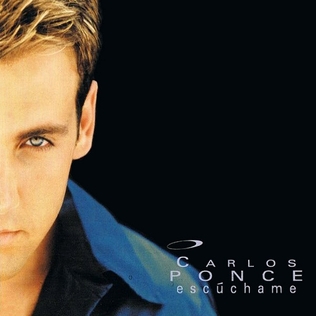
"Escúchame" is a song by Puerto Rican entertainer Carlos Ponce from his second studio album, Todo lo Que Soy (1999). The song was written and produced by Marco Flores. It was released as the album's lead single on August 16, 1999, by EMI Latin. A flamenco pop ballad, it features Ponce making a plea to a woman he loves. The song received positive reactions from music critics, who praised its melody and genre. Commercially, the song reached number one on the Billboard Hot Latin Songs and Latin Pop Airplay charts in the United States. The song's music video was filmed in Old San Juan in Puerto Rico and features the artist impressing a woman in a club. A Portuguese-language version of the song was released in Brazil, where it reached number one.



















